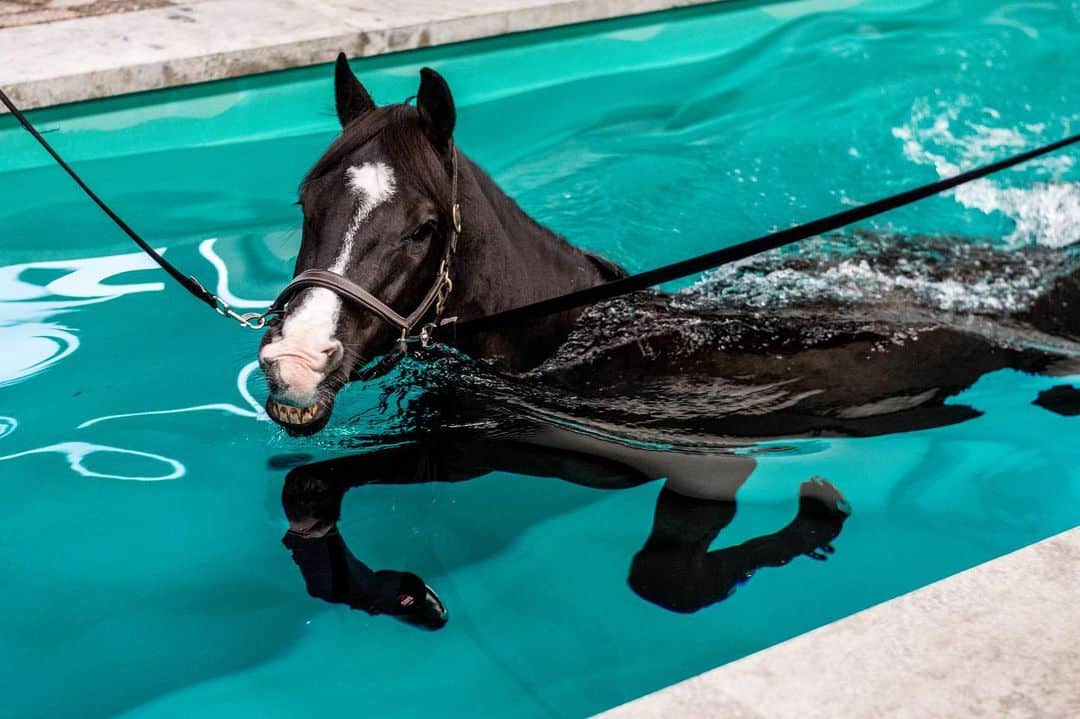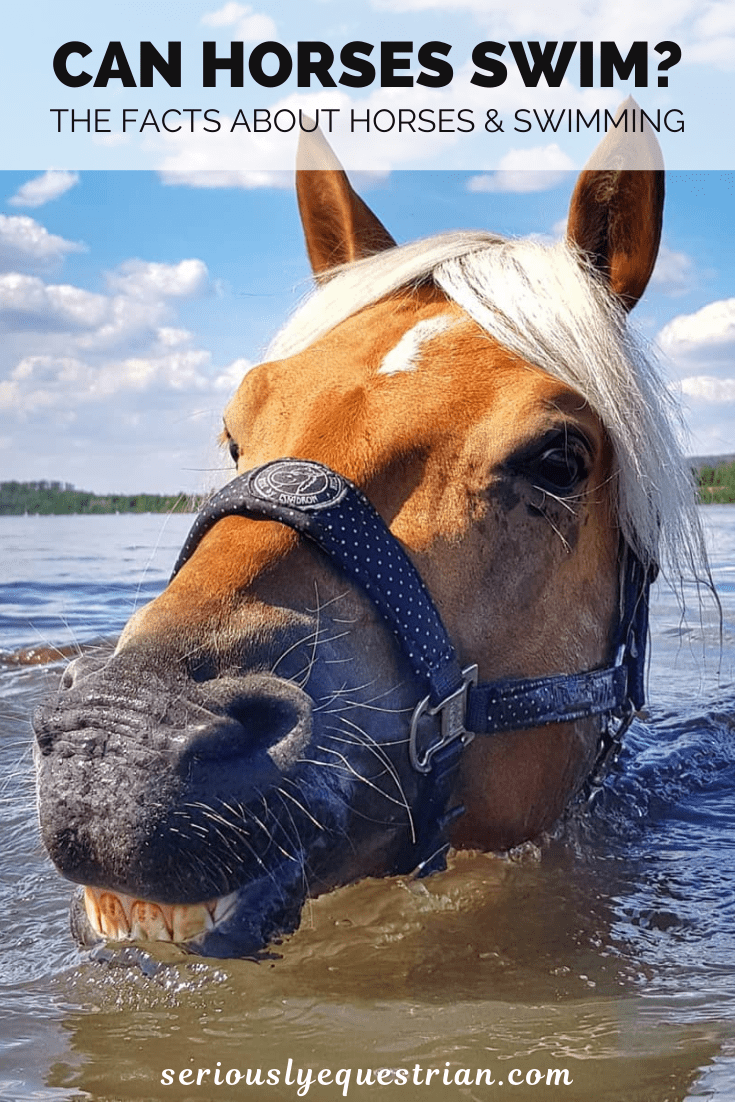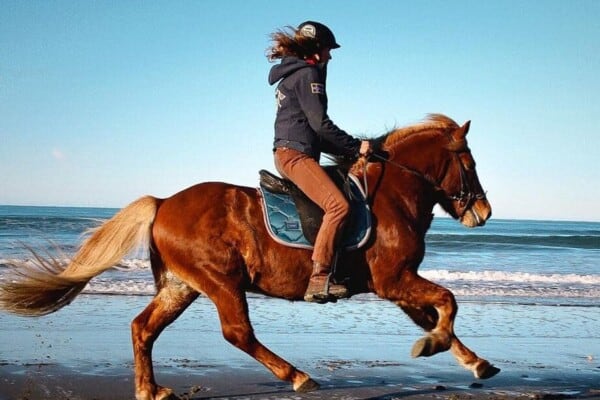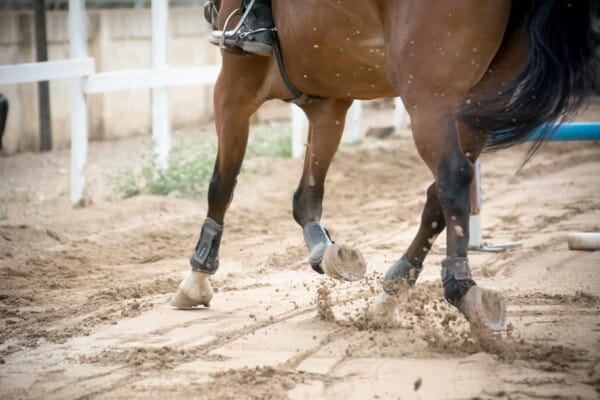Horses, like many mammals, can swim naturally without being taught. When a horse swims, it paddles, similar to how a dog swims. If you looked through a clear window that allows you to see underwater, it would look like the horse doing a type of trot in the water. However, horses aren’t necessarily natural water lovers. Some horses enjoy the water and will go straight in, paw and splash in the water, while others won’t dip their hoof in a puddle. This is the same as dogs and many other four legged animals who are not natural water lovers.
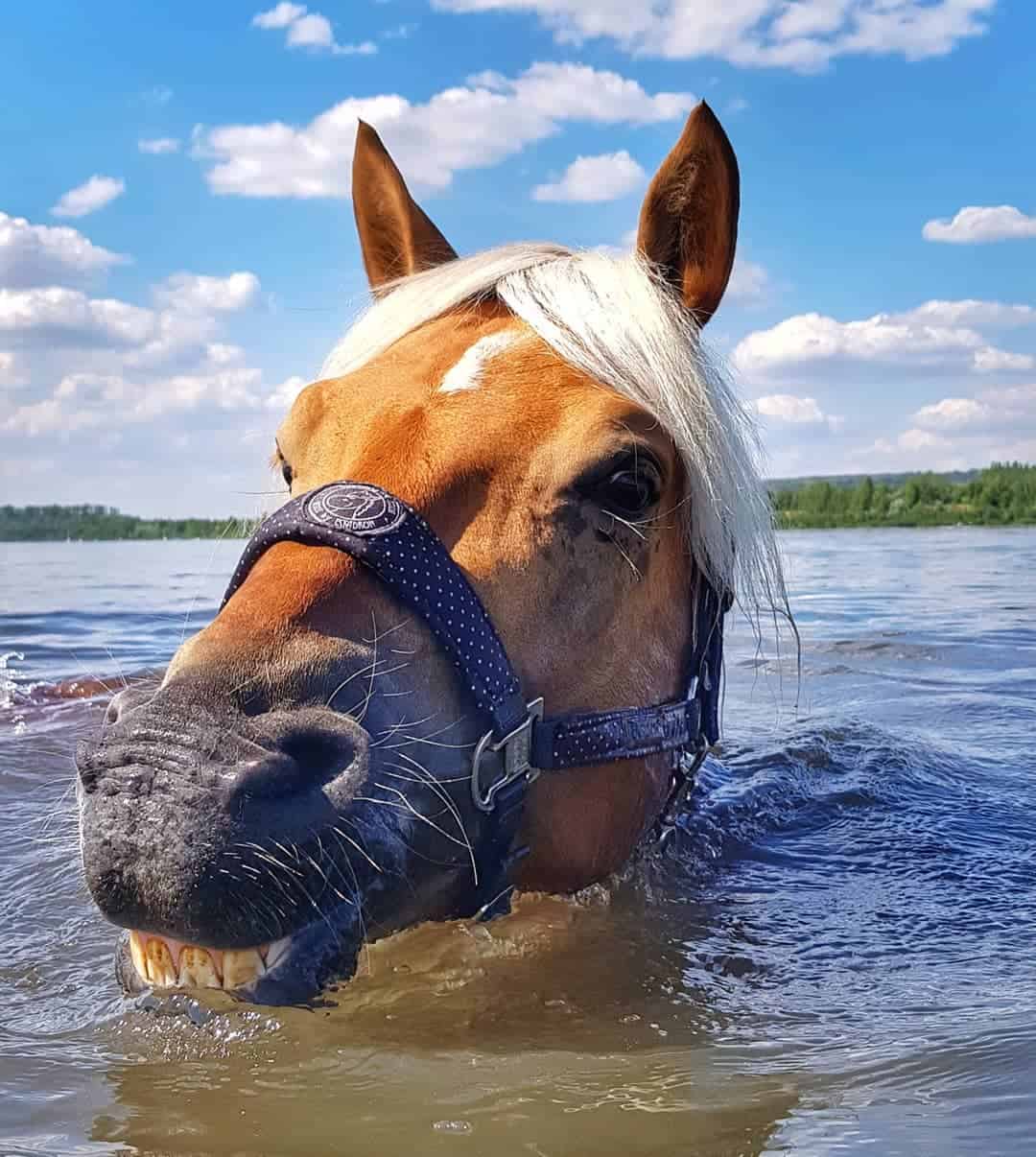 In the wild, horses will often cross rivers to gain access to food or shelter and escape danger. They grow up learning these skills from birth. However, a domestic horse does not learn the same survival skills as a wild herd. As a result, his ideas about entering the water can vary from enthusiastic to no way! It is important to remember that each horse is an individual and will have their own preferences when it comes to swimming.
In the wild, horses will often cross rivers to gain access to food or shelter and escape danger. They grow up learning these skills from birth. However, a domestic horse does not learn the same survival skills as a wild herd. As a result, his ideas about entering the water can vary from enthusiastic to no way! It is important to remember that each horse is an individual and will have their own preferences when it comes to swimming.
For the most part, you won’t see horses wading deep enough to swim for their own pleasure. However, many horse owners enjoy spending time with their horses in the water. It is important to understand why a horse might be afraid of water and the safety precautions you need to take before attempting it. In addition to fun with your horse, swimming horses has become a popular rehab and fitness tool for sport horses.
Are horses afraid of water?
In general no, but once again every horse is different. Besides not having an innate love to go deep into water for a swim, horses may hesitate for several reasons.
A horse does not have the same depth perception as a human. We have to have some understanding of the vision of the horse to know that the horse isn’t necessarily being naughty. When a horse looks at water, be it a puddle, stream, river, or ocean, he cannot tell how deep it is. This is because of the location of the eyes on the side of the head. To the horse, he is literally stepping into the unknown.
Another reason a horse may try to avoid water is that he simply doesn’t like being wet. If you spend enough time around horses, you’ll notice which ones look miserable out in the rain or try to get to shelter when riding in it. When these types of horses get wet, they will often roll vigorously when back in their stable to dry off.
Fear also has a big influence on whether a horse will go into water or not. The horse can be scared of the unknown, not being able to judge what is below the water’s surface. The noise of waves crashing can also cause fear.
Safety when swimming with horses
Swimming is extremely tiring for a horse. You need to slowly introduce your horse to water and limit the time you are deep enough that it requires swimming. A short 10-minute swim is equivalent to cantering your horse for several miles! You must be careful, or you can get into serious trouble in deep water with a tired horse.
Scared horses in the ocean will often swim out to sea. This is very dangerous for both the rider and the horse. A horse has trouble turning in water and nearly always chooses to swim in a straight line. There have been many cases of horses in the ocean heading out to sea instead of turning back towards the beach, often ending tragically.
Introduce your horse to sea swimming slowly and never go alone. Use a rope instead of reins, so you have a chance of trying to turn your horse back in the right direction. Ideally, someone in a kayak or canoe should be present to monitor and provide rescue.
Choose your swimming locations wisely. Ensure the water is free from dangerous currents, rough waves, and underwater hazards, including animals that could attack or cause injury.
Can you ride a horse while it swims?
It is possible for a horse to swim with a rider on their back the rider should take lots precautions to ensure the horses and their own safety. A rider adds an extra weight and can negatively affect a horses buoyancy. Always be aware that unlike humans horses cannot hold their breath under water. This means they are at risk of drowning even if their head is submerged for a very short period of time.
If riding a swimming horse be mindful to move with the horse and avoid dragging.
How long can horses swim for?
This depends on the horse and a number of factors such as the type of water they are swimming in, the depth, with or without rider, experience of swimming, and overall cardiovascular health. This Racehorse in Australia swam for nearly 7 miles before being rescued. Other less athletic or older horses may barely be able to keep themselves afloat and may be able to swim for only a couple of minutes
Swimming for horses is hard work and they can quickly become exhausted after just a couple of minutes. For this reason it is important to ensure that they only swim at a safe depth.
Swimming therapy
Swimming has become an increasingly popular rehab technique for horses. The lack of concussive shock provides an excellent way to develop strength in muscles, tendons, and ligaments. It provides an aid for healing without excessive strain on the injured area. In addition to improving muscular strength, pools and treadmills help increase heart and lung capacity.
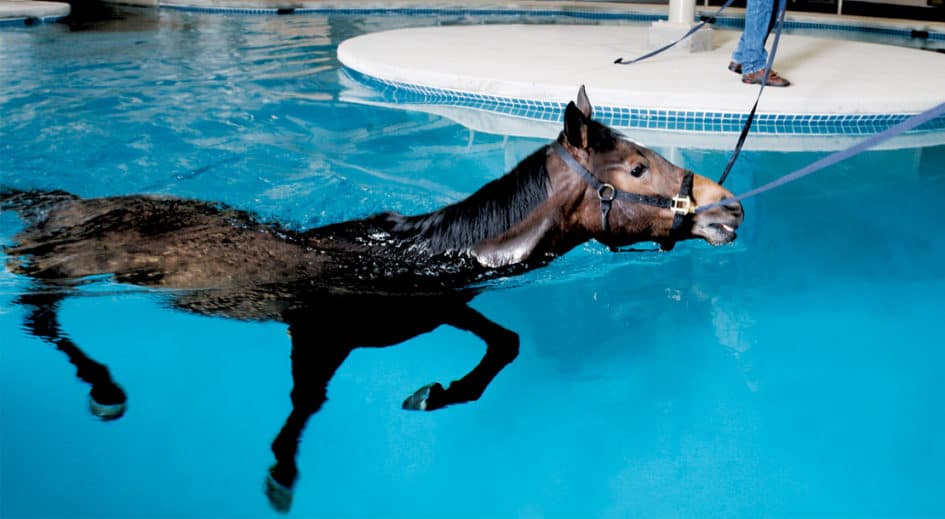
Rehab and fitness training uses both pools and water treadmills. Some equine hospitals also use pools for waking up a horse after surgery, a process that can result in serious injury.
Using pools and treadmills must be done under the guidance of experienced hands. This is to ensure the horse is introduced to them correctly and not overworked. Some horses with respiratory issues or draining wounds should not use a pool or treadmill. Always embark on using these tools under the advice of a vet.
Such rehabilitation efforts often require highly specialized treatment centers and expertise. As a result swim therapy for horses can be extremely expensive.
Conclusion
To conclude, yes, horses can swim. However, going deep enough to swim may not be a horse’s idea of fun. Some may enjoy going into the water to cool off or splash, but not swim. Some horses may not like water at all. It is important to know your horse’s particular personality. Introduce your horse to water slowly and keep swimming time to a minimum. Combine this with sensible safety precautions, and you will have endless bonding time that both you and your horse will enjoy.

